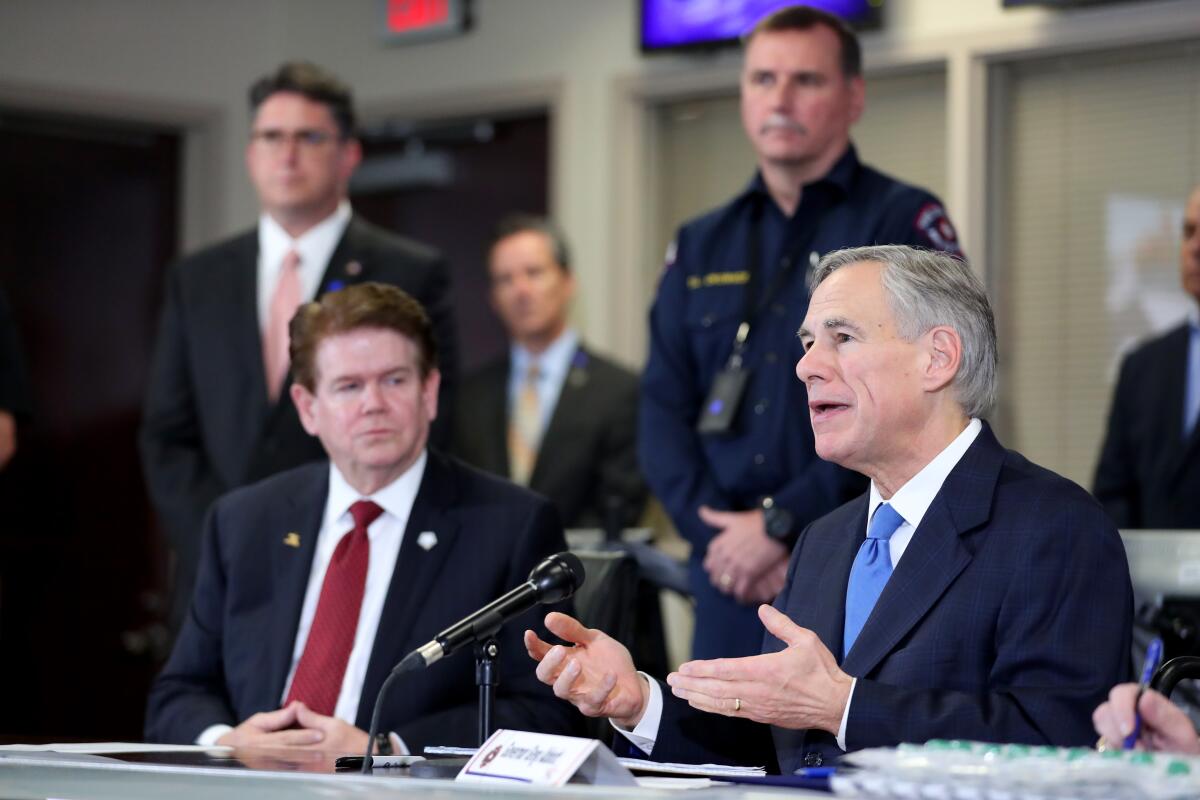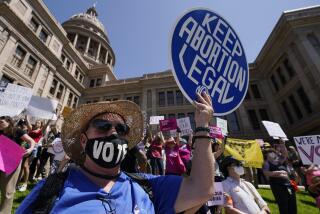Amid coronavirus outbreak some red states move to restrict abortion, spurring legal fight

Six Republican-led states are moving to dramatically curtail access to abortion amid the coronavirus pandemic, prompting a wave of lawsuits that could soon bring the dispute to the Supreme Court.
While several states and the federal government have discouraged nonessential medical procedures like cosmetic surgery and elective dental work during the national health crisis, six states — Indiana, Iowa, Mississippi, Ohio, Oklahoma and Texas — went a step further, prohibiting abortion, unless to protect the life or health of the woman.
The Republican governors say their orders are vital to preserving hospital capacity and personal protective equipment for healthcare workers treating COVID-19 cases.
But abortion rights supporters say the states are exploiting the crisis to block or delay access to abortions, perhaps until a pregnancy is so far along it will be harder or impossible to end. They say the orders violate Supreme Court rulings first spelled out in Roe vs. Wade that states cannot ban abortion before a fetus is viable outside the womb, about 24 weeks.
They also note that many abortions conducted early in a pregnancy — up to 10 weeks under the Texas law — rely on a pill and can be completed with no use of hospital or personal protective equipment.
Federal judges have blocked the bans from going into effect in nearly all the states. But the 5th Circuit Court of Appeals allowed the Texas ban to take effect on a temporary basis. Abortion providers vowed to appeal to the Supreme Court if necessary.
“We are absolutely ready to take every legal action that we have to to keep clinics open,” said Nancy Northup, president of the Center for Reproductive Rights, the legal organization representing providers in several states. “These emergency abortion bans are an abuse of power and they are a part of a long-term effect to use sham justifications to shut down clinics and make an end-run around Roe vs. Wade.”
The order is having an immediate effect in Texas. Already, the Planned Parenthood facility and other providers that have filed suit have had to cancel hundreds of scheduled appointments.
In Texas, the prohibition includes “any type of abortion that is not medically necessary to preserve the life or health of the mother,” according to state Atty. Gen. Ken Paxton. Violating the ban would result in a $1,000 fine or six months in jail for the provider.
In Iowa, Gov. Kim Reynolds and abortion providers on Wednesday reached agreement to allow surgical abortions if delaying them would push the patient past the point at which legal abortions are allowed, according to the Associated Press.
In Michigan, Democratic Gov. Gretchen Whitmer — who recently clashed with President Trump over the federal response to the virus — did not include abortion in her order blocking nonessential procedures. Anti-abortion groups including the Susan B. Anthony List and Michigan Right to Life chastised her decision.
“Gov. Whitmer should end these unnecessary procedures that further strain our healthcare system, and abortion businesses in the state should cooperate,” said SBA List President Marjorie Dannenfelser, who also condemned Democratic Pennsylvania Gov. Tom Wolf’s order for not including abortion.
Governors have framed the state orders as temporary, saying they will last for a limited number of days, or for as long as there is an emergency. They’ve said women can wait until after the bans are lifted to obtain an abortion. But that won’t be an option for many women since federal and many state guidelines encouraging people to stay home will be in effect for another month at least, if not longer.
The legal battle marks a continuation of what has been a decades-long effort by many red states to limit access to abortion. If the Supreme Court is asked to make an emergency ruling on the issue, it could provide an unexpected early glimpse of how the recently reshaped bench views abortion rights.
Justices were already expected to deliver by June the first abortion ruling since Trump’s two appointees joined the court, in a Louisiana case questioning whether abortion providers need to have admitting privileges at a nearby hospital. If suddenly faced with an emergency appeal over the Texas order, “the Supreme Court may be forced to weigh in on this much sooner than [the justices] wanted to,” said Mary Ziegler, a professor at Florida State University College of Law who has written extensively about the legal history of abortion.
That should concern abortion rights supporters, she said. “This court ... has a track record of granting more leeway to the government in times of emergency,” she said.
U.S. District Judge Lee Yeakel, who temporarily blocked the Texas order from taking effect, suggested that only the justices could undermine the Roe decision to allow for a “silent ‘except-in-a-national-emergency clause.’”
In court documents, Republican state leaders argue that they have the authority to temporarily ban access to nonessential healthcare procedures to protect the health of all citizens during a pandemic.
They say that allowing abortions to proceed — while not allowing other medical procedures — would give abortion an elevated status.
“The right to abortion does not have preeminence over all of the other individual liberties that are being temporarily curtailed,” Texas wrote in court documents this week.
Steve H. Aden, chief legal officer and general counsel at Americans United for Life, which opposes abortion, anticipates the court would allow the state orders to remain in place because the country is fighting a pandemic.
“The power of the state to take extreme measures to deal with a health crisis like this is really the apex of its constitutional powers,” he said, citing a 1905 precedent that let states fine or imprison citizens who did not get a small pox vaccine during an epidemic of the disease. “There really isn’t much that a state cannot do to respond to what is truly a health emergency.”
Abortion rights supporters dispute the idea that abortion is a nonessential procedure comparable to a face lift or carpal tunnel surgery, and instead is time-sensitive and constitutionally protected.
They also say that while the coronavirus emergency is real, closing abortion clinics won’t change the pandemic’s trajectory.
Ending access to abortion “doesn’t lower the risk of transmitting the virus. It just forces people to stay pregnant and have children against their will,” said Jennifer Dalven, director of the reproductive freedom project at the ACLU. “So it’s not surprising that the states that are now using the COVID crisis to stop people from getting abortion care are the very same states that have a history of passing laws to ban abortion or using sham rationales to shut down clinics.”
Dalven says the orders have to be viewed through the lens of the states’ long-standing opposition to abortion and history of enacting prohibitions on the procedure through medical regulation, which undermines their case that they’re working to protect the public from the coronavirus.
The Supreme Court heard a case last month that questions a Louisiana regulation requiring abortion providers have admitting privileges at a nearby hospital. The court has not yet issued a decision.
More to Read
Get the L.A. Times Politics newsletter
Deeply reported insights into legislation, politics and policy from Sacramento, Washington and beyond. In your inbox three times per week.
You may occasionally receive promotional content from the Los Angeles Times.







